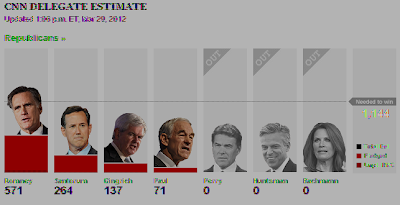Introduction
If you have kept up at all with the GOP (Grand Old Party) presidential nominee race this year, you've heard the number "1,144" at least once--but why is this number so important?
For the last several months, Republican candidates Ron Paul, Mitt Romney, Newt Gingrich, and Rick Santorum have campaigned in multiple states during the primary election system to become the Republican nominee to face Barack Obama for the Office of the President of the United States of America. In order to become the nominee, the candidate must obtain 1,144 delegates. A candidate obtains these delegates from each state's primary or caucus (whatever that particular state decides to hold) depending on what percentage of the vote they get from each state. Got it? Me either. Let's take a look at this a little closer.
What is a delegate?
"Delegates are individuals chosen to represent their states at their party conventions prior to a presidential election. The rules for selecting delegates, which are dictated by the parties, can be dizzying—the guidelines vary not only by party, but by state, and sometimes by congressional district" (www.cfr.org).
During the Primary election process, when you vote during your state's primary (or attend your state's caucus) you vote goes towards the delegate of your state and they are thus required to vote for the candidate that you chose for. Take, for example, the primary from Oklahoma:
(cnn.com)
As you can see, Rick Santorum received 96,759 votes, or 34% of the total votes. Based on that tally, Santorum received 14 delegates (total delegates of 43 x .34=14). Here's a good video on the nomination process:
How many delegates does each state have?
I could not find a good spreadsheet on delegate count per state, so I made one! Please feel free to download and share as needed. (Data from Cnn.com)
2012 Delegate CountWhy 1,144?
At the Republican national convention, all the delegates will meet and cast their vote for the candidate that their state voted for. However, all a candidate needs to win the GOP nomination is 1,144--but why? At the Republican national convention this year, there will be a total of 2,286 delegates. In order for the GOP candidate to win the nomination, they must win majority of the delegate--i.e. half of 2,286 plus 1 (2,286/2=1,143 + 1=1,143). If no candidates reach 1,144 delegates prior to the convention, all delegates will have a free vote and they can vote for whoever they choose--also called a "brokered convention".
Where do the candidates stand now?
(data from cnn.com)
So the question is, will any of these candidates reach 1,144 delegates? It is still a long way to go, but the rest of the race will be interesting. It is also important to note that depending on which website you visit, the delegate count might be slightly different. CNN has their own analyst, FoxNews has their own analyst, etc.




